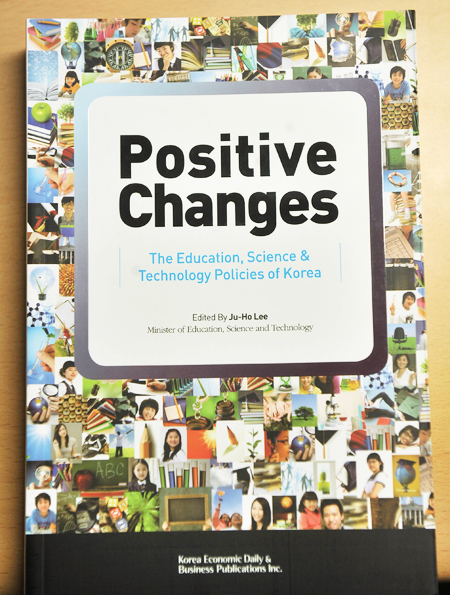'I believe in power of education'
Published on | Source
The education ministry has published the English-language version of the Lee Myung-bak administration's educational white paper, released late last year. The 587-page book, titled "Positive Changes", introduces the government's key educational and science policies. The publication is an effort to share Korea's passion for education and technological advancement with the rest of the world, especially lessdeveloped nations that are eager to learn from the country.
Advertisement
By Na Jeong-ju
Korea's education system has become a crucial "export item" as its rise from post-war poverty to international prominence, driven by people's zeal for education, has provided a roadmap for a number of developing countries.
Domestically, however, Korean educators have often been the target of public criticism regarding the heavy household burden on private education and rampant violence at schools. There are complaints that teachers are not treated fairly despite their contributions to society.
Why does the perception gap exist?
 According to Education, Science and Technology Minister Lee Ju-ho, the education fever has indeed made what Korea what it is today, but at the same time it has produced a lot of side-effects.
According to Education, Science and Technology Minister Lee Ju-ho, the education fever has indeed made what Korea what it is today, but at the same time it has produced a lot of side-effects.
"As education chief, I'm fully responsible for what's happening at schools. The recent controversy over school brutality shows that we have been neglecting to help students in building character", Lee said in an interview.
Power of education
He stressed the power of education.
"It's an undeniable fact that Korea's economic prosperity today was possible thanks to the people's zeal for education", he said.
"Even when the country was struggling with poverty and was dependent on assistance from foreign countries, parents in Korea sacrificed everything for their children's education. Highly-trained individuals nurtured through such dedication helped achieve the economic miracle".
Lee said U.S. President Barack Obama's positive comments in recent months on Korean teachers and parents have enhanced the international recognition of Korean education.
On numerous occasions, Obama cited the enthusiasm of parents toward education as one of the key factors that enabled Korea's economic growth. He has also praised Korean parents for their dedication to their children's education.
During the APEC Education Ministerial Meeting, scheduled from May 21 to 23 in Gyeongju, North Gyeongsang Province, the minister plans to share those ideas and vision with participants. It is expected to draw some 500 people, including education chiefs of 21 APEC members, representatives of global institutions and corporate executives.
The ministry will operate a tour program for foreigners to help them visit nearby Korean schools and meet with students.
Minister Lee plans to deliver a keynote speech on Korea's growing role in the global educational sector on May 22 after Muhamad Noor Yacob, executive director of the APEC secretariat, speaks. Before the closing ceremony on May 23, participating countries will issue a joint statement to put their agreements into action and vitalize educational exchanges, the ministry said.
Wake-up call
Lee has taken a series of bold initiatives to reshape the educational sector since he took the helm of the education ministry on Aug. 30, 2010. The ministry started the World Class University and the World Class College programs to nurture globally competitive universities and vocational colleges.
In the same vein, he is trying to change the way students learn English here. The ministry plans to initiate the National English Ability Test (NEAT), a state-administered English proficiency exam, next month for high school students. Based on the tests, it will decide later this year on whether to replace the English-language section of the nation's college entrance exam with NEAT, an Internet-based TOEIC-style exam.
On top of that, the ministry has activated after-school programs at elementary and secondary schools in close cooperation with regional education offices in a bid to relieve household spending on private education.
It has also chosen the so-called Meister schools that focus on technical education and apprenticeships, in which students can develop expertise in such fields as shipbuilding, mechanical engineering, semiconductors and medical services.
"I hope such programs will help diversify education for teenagers in a country where parents spend massive sums of money on private tutoring to send their children to a handful of top universities", Lee said.
"Students endure fierce competition due to parents' zeal for education and the government's emphasis on the college entrance exam.
However, the education fever is what enabled Korea's rapid economic growth and contributed to today's current conditions. We should be proud of that".
Indeed, excessive competition among students to enter college has damaged the spirits of equal educational opportunities and public education.
One of the biggest concerns for educators now is violence in schools. In the wake of a series of suicides by students because they were so severely bullied, the ministry announced a package of measures to root out bullying, empowering principals to suspend violent pupils from schools and to institute an alert system for organized student gangs.
The root cause of the problem is the competition-oriented school system, Lee said.
"Bullying among peers is not just a Korean problem. It happens everywhere. However, the recent violent cases were a wake-up call for all of us", he said. "We are trying to diversify ways for students to enter college and help students develop character instead of only forcing them to study".
The APEC meeting in Gyeongju is the largest-ever educational event to be held here. The ministry has opened the official Korean and English language websites and boosted two-way communication through social networking sites.
Korea was selected as the host of the meeting during the APEC Human Resources Development Working Group forum in Washington in March. It is the second Asian country to host the event after Singapore in 2000. The last meeting was held in 2008 in Peru.
